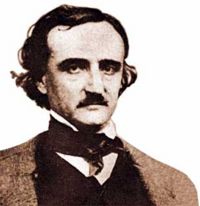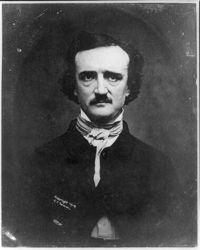Edgar Allan Poe
 From Conservapedia
From Conservapedia Edgar Allan Poe (1809-1849) was an American poet, editor and author, and a pioneer of short stories. He is most famous for his dark and morbid themes, although he also wrote some lesser known light-hearted works. Among his most famous and haunting works were "The Tell-Tale Heart" (1843) and "The Raven" (1845).
Poe considered himself a Christian. His views at the time he wrote his non-fiction treatise of science and religion, "Eureka", believed in a Creator but rejected that God was “omnipotent, omniscient,” preferring instead to view God and Nature as distinct.[1]
Contents
Life[edit]
Poe was born in Boston in 1809, and was raised in Richmond, Virginia, after his mother's death in 1811. He was educated in England and in Virginia.
In 1836, he married his first cousin Virginia Clemm, three months before her 14th birthday. Poe was an alcoholic, and drank increasingly after his wife's death in 1847. In 1849, he was found on the streets in Baltimore and died soon after. The cause of Poe's death remains unknown.[2]
Poe was one of 102 Americans to be inducted into the Hall of Fame for Great Americans.
Gravesite[edit]
Poe is buried in Baltimore. For six decades, on Poe's birthday, a mysterious figure has appeared at Poe's grave, leaving flowers and a bottle of cognac. It is believed that in 1998, the original "donor" had passed on, and the tradition was taken over by his son. Many in Baltimore are aghast at the thought of the identity of the man ever being revealed.[3] The visitor failed to appear in either 2010 or 2011.
Literary Impact[edit]
Poe's works had a mixed, but largely negative, reception among literary circles during his life, but they were to have great influence on writers, particularly European writers, after his death. He remains one of the first American writers to be widely admired by European audiences, who in the 19th century had little respect for American literature.
But because of his use of imagination and his diving into the grotesque, the absurd, and darkness of dreams, he is linked with the creation of the surrealism movement and, from his staunch ideas on writing, inspired whole new genres to acquire the fame and fortune that eluded him. The famous pseudo-science fiction writer Jules Verne lists Poe as his main inspiration, as have other foreign writers, including Jorge Luis Borges, Franz Kafka, and the contemporary author Carlos Fuentes. As American author Joyce Carol Oates put it, "Who has not been influenced by Poe?"[4]
His short story "The Murders in the Rue Morgue" (1841), and its sequels, are considered to be the first detective stories,[5][6] and were a major influence on Arthur Conan Doyle's Sherlock Holmes stories.
"The Gold-Bug" (1843) is an imaginative tale which gives an example of elementary cryptanalysis (code-breaking), as well as being one of the earliest examples of pirate-related fiction, forty years before Robert Louis Stevenson popularised the genre with Treasure Island.
Works[edit]
Poetry[edit]
- O, Tempora! O, Mores! (1825)
- Song (1827)
- Imitation (1827)
- Spirits of the Dead (1827)
- A Dream (1827)
- Stanzas (1827)
- Tamerlane (1827)
- The Lake (1827)
- Evening Star (1827)
- A Dream (1827)
- To Margaret (1827)
- The Happiest Day (1827)
- To The River (1828)
- Romance (1829)
- Fairy-Land (1829)
- To Science (1829)
- To Isaac Lea (1829)
- Al Aaraaf (1829)
- An Acrostic (1829)
- Elizabeth (1829)
- To Helen (1831)
- A Paean (1831)
- The Sleeper (1831)
- The City in the Sea (1831)
- The Valley of Unrest (1831)
- Israfel (1831)
- The Coliseum (1833)
- Enigma (1833)
- Fanny (1833)
- Serenade (1833)
- Song of Triumph from Epimanes (1833)
- Latin Hymn (1833)
- To One in Paradise (1833)
- Hymn (1835)
- Politician (1835)
- May Queen Ode (1836)
- Spiritual Song (1836)
- Bridal Ballad (1837)
- To Zante (1837)
- The Haunted Palace (1839)
- Silence, a Sonnet (1839)
- Lines on Joe Locke (1843)
- The Conqueror Worm (1843)
- Lenore (1843)
- Eulalie (1843)
- A Campaign Song (1844)
- Dream-Land (1844)
- Impromptu. To Kate Carol (1845)
- To Frances (1845)
- The Divine Right of Kings (1845)
- Epigram for Wall Street (1845)
- The Raven (1845)
- A Valentine (1846)
- Beloved Physician (1847)
- An Enigma (1847)
- Deep in Earth (1847)
- Ulalume (1847)
- Lines on Ale (1848)
- To Marie Louise (1848)
- Evangeline (1848)
- A Dream Within A Dream (1849)
- Eldorado (1849)
- For Annie (1849)
- The Bells (1849)
- Annabel Lee (1849)
- Alone (1875)
Tales[edit]
- Metzengerstein (1832)
- The Duc De L'Omelette (1832)
- A Tale of Jerusalem (1832)
- Loss of Breath (1832)
- Bon-Bon (1832)
- MS. Found in a Bottle (1833)
- The Assignation (1834)
- Berenice (1835)
- Morella (1835)
- Lionizing (1835)
- The Unparalleled Adventure of One Hans Pfaall (1835)
- King Pest (1835)
- Shadow - A Parable (1835)
- Four Beasts in One - The Homo-Cameleopard (1836)
- Mystification (1837)
- Silence - A Fable (1837)
- Ligeia (1838)
- How to Write a Blackwood Article (1838)
- A Predicament (1838)
- The Devil in the Belfry (1839)
- The Man That Was Used Up (1839)
- The Fall of the House of Usher (1839)
- William Wilson (1839)
- The Conversation of Eiros and Charmion (1839)
- Why the Little Frenchman Wears His Hand in a Sling (1840)
- The Business Man (1840)
- The Man of the Crowd (1840)
- The Murders in the Rue Morgue (1841)
- A Descent into the Maelstrom (1841)
- The Island of the Fay (1841)
- The Colloquy of Monos and Una (1841)
- Never Bet the Devil Your Head (1841)
- Eleonora (1841)
- Three Sundays in a Week (1841)
- The Oval Portrait (1842)
- The Masque of the Red Death (1842)
- The Landscape Garden (1842)
- The Mystery of Marie Roget (1842)
- The Pit and the Pendulum (1842)
- The Tell-Tale Heart (1843)
- The Gold-Bug (1843)
- The Black Cat (1843)
- Diddling (1843)
- The Spectacles (1844)
- A Tale of the Ragged Mountains (1844)
- The Premature Burial (1844)
- Mesmeric Revelation (1844)
- The Oblong Box (1844)
- The Angel of the Odd (1844)
- Thou Art the Man (1844)
- The Literary Life of Thingum Bob, Esq. (1844)
- The Purloined Letter (1844)
- The Thousand-and-Second Tale of Scheherazade (1845)
- Some Words with a Mummy (1845)
- The Power of Words (1845)
- The Imp of the Perverse (1845)
- The System of Doctor Tarr and Professor Fether (1845)
- The Facts in the Case of M. Valdemar (1845)
- The Sphinx (1846)
- The Cask of Amontillado (1846)
- The Domain of Arnheim (1847)
- Mellonta Tauta (1849)
- Hop-Frog (1849)
- Von Kempelen and His Discovery (1849)
- X-ing a Paragrab (1849)
- Landor's Cottage (1849)
Essays[edit]
- Maelzel's Chess Player (1836)
- The Daguerreotype (1840)
- The Philosophy of Furniture (1840)
- A Few Words on Secret Writing (1841)
- The Rationale of Verse (1843)
- Morning on the Wissahiccon (1844)
- Old English Poetry (1845)
- The Philosophy of Composition (1846)
- The Poetic Principle (1846)
- Eureka (1848)
Hoaxes[edit]
- The Balloon-Hoax (1844)
Novels[edit]
- The Narrative of Arthur Gordon Pym of Nantucket (1837)
- The Journal of Julius Rodman (1840)
Plays[edit]
- Scenes From 'Politian' (1835)
Others[edit]
- The Conchologist's First Book (1839)
- The Light-House (1849)
See also[edit]
References[edit]
- ↑ https://hollowverse.com/edgar-allan-poe/
- ↑ The Poe Museum, "Poe's Life", by James Southall Wilson
- ↑ https://www.foxnews.com/story/0,2933,182243,00.html
- ↑ A Writer of Influence
- ↑ Origins of Detective Fiction
- ↑ Poe launched the new genre of detective fiction with 1841's "The Murders in the Rue Morgue." [1]
External links[edit]
- Works by Edgar Allan Poe - text and free audio - LibriVox
- The Edgar Allan Poe Society of Baltimore
- Poe's Works at Project Gutenberg
- The Narrative of Arthur Gordon Pym The Literature Network (online-literature.com).
| ||||||||||||||
Categories: [American Authors] [American Poets] [Featured articles]
↧ Download as ZWI file | Last modified: 03/06/2023 04:35:06 | 71 views
☰ Source: https://www.conservapedia.com/Edgar_Allan_Poe | License: CC BY-SA 3.0
 ZWI signed:
ZWI signed:

 KSF
KSF